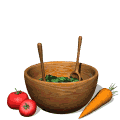

NUTRIENTS - a chemical substance found in food that is used by the body for growth and health. Nutrients provide energy. They serve as the body's building material. They maintain or repair body parts. The six nutrients are Water, Carbohydrates, Fats, Proteins, Vitamins, Minerals.
A) WATER - fluid that is essential for life. Much of the body is water (~80%) , it carries the other nutrients to all parts of the body and carries waste from all parts of the body.
B) CARBOHYDRATES - a nutrient that provides our main source of energy (4 calories per gram) to our muscles and our brains. It is found mainly in grain products and in vegetables & fruit. Carbohydrates include sugars, starch and fibre.
C) DIETARY FAT - a nutrient found in food that gives us energy (9 calories per gram). Fat has many functions including transporting nutrients and forming part of many body cells. Fat is found naturally in animal products (meat, cheese, milk & vegetable oils).
D) PROTEINS - a nutrient that provides energy for our bodies (4 calories per gram) and is used to build and maintain the tissue throughout the body (muscles, organs, and some hormones). It is found in milk products, eggs, meat, poultry, fish, nuts, seeds & legumes.
E) VITAMINS - nutrients needed by the body in very small amounts (vitamin A and folic acid). They do many things to help the body grow and stay healthy.
F) MINERALS - nutrients needed by the body in very small amounts. They help the body in many ways (build bones, teeth & help build muscles). Examples of minerals: calcium, phosphorus, sodium & potassium.
OTHER IMPORTANT TERMS
CALORIES - the measure of energy supplied by the food we eat.
ENERGY - the ability of foods to maintain life and do work in the body. Energy is measured in calories (Cal) or kilojoules (kJ).
FIBRE - the indigestible part of plant foods that helps to move food through the digestive tract.
CALCIUM - an essential (necessary) nutrient for bone production & muscle contraction.